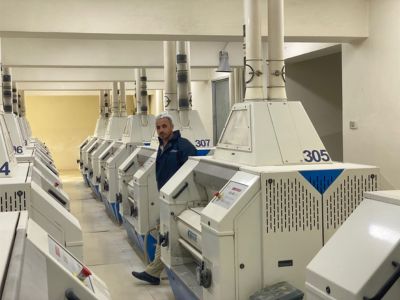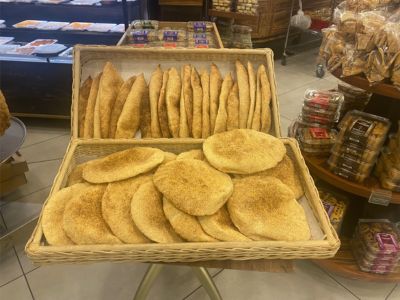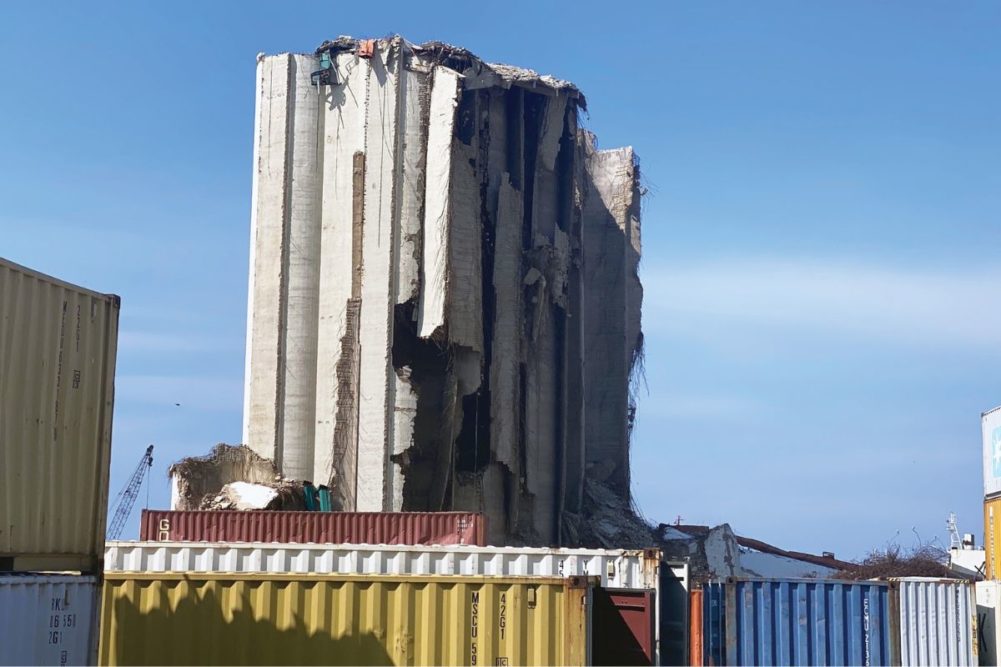BEIRUT, LEBANON — National economic collapse, a bankrupt and dysfunctional public sector, hard currency shortages, a massive port explosion, unprecedented government intervention, the Ukraine war’s threats to wheat supply and the impact of the long-running conflict in Syria are just some of the challenges that Lebanon’s tight-knit and highly sophisticated milling and baking industries have confronted in recent years. The COVID-19 pandemic barely resonated in comparison.
Despite the shocks, all 12 of Lebanon’s privately held flour milling enterprises have continued steadily in operation importing and processing an average of 600,000 tonnes of wheat annually to feed a population of 6.5 million, 2 million of whom are refugees, the highest proportion of any country.
The biggest change has been the introduction of state subsidies of flour and bread to the level of many other countries in the Middle East and North Africa. Lebanon had been an outlier in this respect, with limited involvement by government in cereals markets. Millers imported all wheat for their own account and competed freely on quality and price.
With stable CIF wheat prices of around $300 per tonne and an exchange rate of 1,500 Lebanese pounds (lira) per US dollar, the cost of 1 kilogram of pita-style flat bread, the staple food, had remained constant at about 1 US dollar per kilogram for many years. In effect, millers and bakers upheld a social contract with government and consumers in exchange for less regulation.
Lebanon was a middle-class country until the ongoing economic collapse that was precipitated in 2019 by a fall of the government. The national currency lost 95% of its value by 2023 due to devaluation and inflation. The savings of a large part of the population were wiped out and incomes of civil servants, including police and teachers, fell to poverty levels. Even as the Lebanese pound depreciated rapidly in the parallel market, Lebanon’s central bank in 2020 began to provide scarce dollars to the milling companies’ banks at its artificially low rate to maintain wheat imports and keep bread prices affordable.
Beginning in January 2023, with both hard currency reserves and wheat stocks at dangerously low levels, the World Bank began disbursement to the Lebanese government of a $150 million loan for emergency financing of 30,000 tonnes per month of wheat imports, the amount deemed necessary for production of flat bread for domestic consumption.
To make non-subsidized flour for a wide range of other baked foods, the millers use dollars, delivered to banks in cash, to buy 10,000 to 15,000 tonnes of wheat monthly at international prices.

One of Lebanon’s largest milling enterprises is Crown Flour Mills with 500 tonnes per day capacity at its mill near the Beirut port.
| Credit: ©DAVID MCKEEWheat imports
External debt funding of wheat imports for subsidized bread has come at the cost of imposition of government central planning on Lebanon’s entire wheat value chain.
Under the World Bank loan scheme six “eligible importers,” consisting of the milling companies that already were active in cereals trading, each submit up to three international offers for every round of procurement. The offers are reviewed by a government committee that selects the bid winners. Payment is directly from the central bank to the wheat exporters but with shipments handled by the milling companies.
Over the last decade Lebanon’s flour producers had come to rely on coaster-size vessels holding less than 10,000 tonnes of soft brown wheat from small Ukrainian ports for the lion’s share of their grain requirement.
The first rounds of procurement under the World Bank scheme resulted in 30,000-tonne cargos of Russian wheat underpricing the CIF price offers from Ukraine.
Subsequently a higher proportion of Ukrainian wheat has been supplied. Because the small vessels loading at minor Danube ports like Izmail and Reni sail within 12 miles of the coast, they were not subject to the inspection delays of the Black Sea Grain Initiative from which Russia withdrew in July.
Non-subsidized, private wheat imports consisting of a few boatloads per month continue to originate from the smaller Ukrainian ports.
Total installed milling capacity in Lebanon may be as high as 3,500 tonnes of wheat per day, while actual consumption is 1,500 tonnes.
Flour milling
The government’s plan allocates a portion of every boatload of wheat to each of the dozen milling enterprises, based partly on their installed capacity. The government planning committee also determines the distribution of flour from these mills to the country’s 150 to 200 bakeries that are permitted to use that flour only for subsidized flatbread.
Formerly, bakeries competed on the quality of their Arabic flatbread through longstanding relationships with mills and relying on well-equipped laboratories to control blending and key parameters.
Since the bakers no longer can choose their flour suppliers and have little problem selling their heavily subsidized bread to queuing consumers, attention to quality may have suffered. The same could apply to the millers who have a guaranteed market for their subsidized flour. Profit margins at both the milling and baking level are squeezed by fixed government prices, further increasing the incentive to crimp.
Flour distribution
The government plan for subsidized flour distribution is now based largely on geography. National Flour Mills in Tripoli, with UAE ownership, serves all bakeries in the north of the country, while Big Mills of the South covers the 30 or so bakeries in the southern region. Two smaller mills in the Beqaa Valley distribute to the eastern interior of the country. The eight mills in and around Beirut supply the country’s only big metropolis but operate, on average, at less than 50% capacity.
Total installed milling capacity in Lebanon may be as high as 3,500 tonnes of wheat per day, while actual consumption is 1,500 tonnes.
Some companies are less dependent than others on production of subsidized flour. One of the largest milling enterprises is Crown Flour Mills with 500 tonnes per day capacity at its mill near the Beirut port. The company said that only 30% of its output is subsidized flour. It is the sole authorized supplier of flour for McDonald’s buns and for Pizza Hut dough. The company has a bakery mix plant as well. At other mills, subsidized flour may account for over 90% of output.

Modern Mills of Lebanon, established in 1965, at the current site near the port, has 300 tonnes per day milling capacity.
| Credit: ©DAVID MCKEEPort operations
On Aug. 4, 2020, the Port of Beirut was the site of one of the largest non-military explosions ever when a warehouse with 20,000 tonnes of poorly stored ammonium nitrate fertilizer ignited. The blast left over 200 dead and 7,000 injured, mainly from broken glass.
The adjacent 120,000-tonne capacity concrete grain elevator also was destroyed, though half of the crumbling structure is still standing, seemingly as a kind of memorial to the victims. Fortunately, it acted as a buffer helping to spare some of the urban area behind it.
Despite much planning and negotiation, and a commitment from the government of Kuwait to donate funds for a replacement of the storage facility whose construction it originally financed in 1964, no start has been made on the on a new port facilty. The main obstacle is the lack of a functioning government due to the failure of the key political groups to agree on a new president.
In the intervening three years, wheat millers have managed by moving wheat directly from quayside in 30-tonne bulk trucks to their mill silos. A number of the largest milling companies are located within a few kilometers of the port. Total wheat storage capacity at flour mills is about 150,000 tonnes.
Frequent arrivals of small vessels make it possible for millers to reduce inventory costs by holding minimal stocks. A daily vessel discharge rate of up to 5,000 tonnes is possible using clamshells filling trucks for shuttling to multiple mills with 100 to 200 tonnes hourly receiving capacity.
Previously all incoming wheat was kept in the now defunct port silo for at least a week until government sampling and testing could be completed. Since the blast, newly arrived wheat has been held in sealed silos at individual mills until laboratory results allow approval by the Ministry of Agriculture of release of the wheat for milling.
Syria
The impact of war-torn Syria on Lebanon’s economy, including wheat milling, should not be understated. During the initial period of subsidies, Lebanon’s government allowed millers to import 50,000 tonnes of wheat monthly bought with dollars acquired at the Central Bank of Lebanon’s exchange rate. Inevitably, much of the surplus wheat flour produced in Lebanon — some sources say up to 40% — was smuggled by traders to Syria, where war had reduced domestic wheat production and international sanctions complicated importation of the cereal.
With the subsidy cut to 30,000 tonnes of wheat monthly, which more closely reflects actual Lebanese consumption, smuggling volumes have declined but have not been eliminated. In addition to truckloads of flour, vanloads of bread regularly transit the porous border to meet demand in Damascus less than 50 kilometers from the nearest Lebanese customs point.
Energy costs
Millers and bakers rely on their own diesel generators to power their mills and ovens. The rule of thumb is 20 liters of diesel to mill 1 tonne of wheat. With imported diesel prices averaging $1 per liter, that meant around $25 cost per tonne of flour.
Grid power had been subsidized by the public utility that imported diesel, but the government no longer has the budget funds to underwrite so much of the cost of electricity consumption. Public electricity rates have been adjusted upwards. Many flour producers have installed the maximum number of solar panels that space permits within their milling compounds, thereby covering 5% to 20% of their energy needs. The payback period on such investments can be less than two years.

Lebanon’s baking industry is reputed for a wide assortment of traditional and western products, high quality standards and attractive packaging.
| Credit: ©DAVID MCKEEBaking
Within the Middle East, Lebanon is noted for its cuisine. Similarly, the country’s baking industry is reputed for a wide assortment of traditional and western products, high quality standards and attractive packaging.
The dedicated stores of the largest baking companies resemble modern, glass palaces with smartly uniformed personnel working product showrooms where as many as 200 different baked products may be on display.
The three largest industrial bakers are Moulin d’Or, Wooden Bakery and Chamsine, each using 40 to 70 tonnes of flour per day, with facilities to receive in bulk.
Moulin d’Or employs 700 people in its central baking plant and showroom store north of Beirut and operates another 16 large franchises for direct sales to consumers. Wooden Bakery has a central bakery and 36 of its own outlets, some housed in supermarket chains.
Surging imports of inexpensive flour from Turkey, and more recently from Russia and Ukraine, is another major challenge for Lebanese millers who get little protection from import tariffs due to the free trade agreements that the country honors. Lebanon depends on imports for 75% of its food consumption, though much of it is imported in bulk and packaged locally.
To make their wide range of non-subsidized products, the largest baking companies have been buying numerous containerloads of flour per month from the export-oriented milling companies clustered around the southeastern Turkish port of Merzin less than a day’s sail from Beirut.
In addition to hidden subsidies for wheat procurement from Ukraine and Russia, the Turkish millers pay only about $0.15 per KwH for electricity, well less than half the energy cost of milling in Beirut. Flour imports from Turkey in 2022 were 16,000 tonnes.
Domestic wheat
Lebanon grows 50,000 to 100,000 tonnes of wheat annually in the Beqaa Valley with acreage trending upward as abandoned fields are brought under cultivation. Much of it is durum wheat, some of which is exported to Turkey, Greece and Italy. Farmers get $400 per tonne from traders who export the wheat on some of the same vessels that bring cheaper Black Sea wheat. A limited amount of domestic durum is purchased by two of the milling companies that have semolina mills but little domestic wheat goes to make bread flour. Instead, it is used for bulgur, pasta and moughrabieh, mostly processed at cottage industry level.
Conclusion
The key question is to what extent the government should devote limited budget resources and add to its debt burden by subsidizing bread consumption for the entire population rather than targeting the most vulnerable groups with cash-based transfers, thereby allowing a renewal of efficient market-based functioning of Lebanon’s wheat value chain.
David McKee’s grain industry consultancy, Key International LCC, provides market research, feasibility analysis, technical studies and project guidance to companies and organizations. He may be reached at [email protected].






